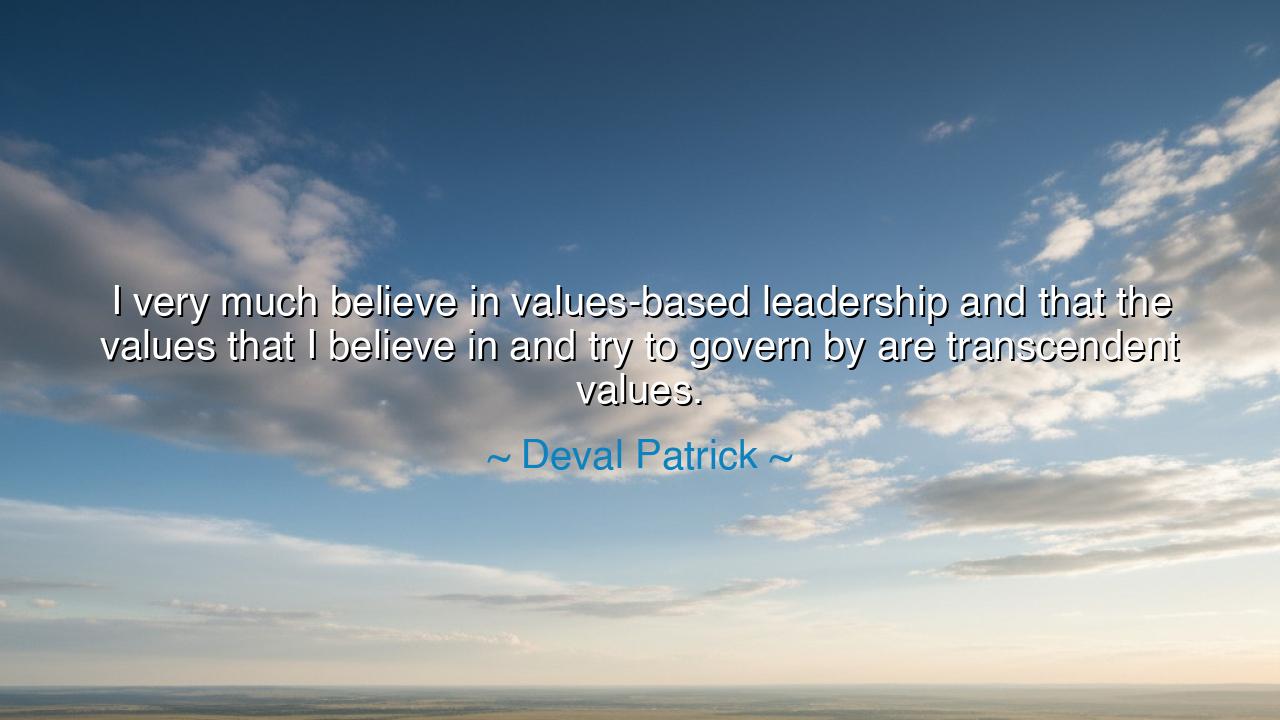
I very much believe in values-based leadership and that the
I very much believe in values-based leadership and that the values that I believe in and try to govern by are transcendent values.






“I very much believe in values-based leadership and that the values that I believe in and try to govern by are transcendent values.” – Deval Patrick
In these luminous and deliberate words, Deval Patrick, former governor of Massachusetts and a voice of moral conviction in modern politics, declares a truth that echoes from the ages: that leadership rooted in values is leadership that endures beyond power, beyond circumstance, and beyond self. His statement is both a philosophy and a confession of faith—faith not in politics or institutions, but in the eternal principles that form the bedrock of civilization. To lead by transcendent values is to guide not by expedience, but by conscience; not by popularity, but by purpose. It is the way of those who see public service not as the pursuit of position, but as the practice of virtue.
The meaning of this quote lies in its distinction between leadership that reacts and leadership that endures. A leader who rules by convenience may gain temporary success, but one who governs by values—by honesty, justice, compassion, and humility—builds something that cannot decay with time. Transcendent values are those that surpass culture, creed, and generation; they belong not to one people or one era, but to the human spirit itself. Truth, integrity, mercy—these are the lights that have guided every civilization from darkness into dawn. Patrick reminds us that true leadership must be tethered to these higher lights, or it will drift into the shadows of corruption and self-interest.
The origin of Patrick’s conviction can be traced to his own life—a journey from poverty on the South Side of Chicago to the halls of Harvard and the governor’s office of Massachusetts. Raised by a single mother in humble circumstances, Patrick was taught that character is the only wealth that cannot be stolen. Throughout his career, he carried this lesson like a torch, refusing to trade principle for political gain. In an age when leadership often bends to the winds of partisanship, he sought instead to anchor it in moral clarity—the conviction that power must always serve people, never the reverse. His belief in transcendent values was not born in comfort but forged in struggle; it was the faith of one who had seen both injustice and opportunity, and who chose to answer both with integrity.
History bears witness to leaders who have followed this same path of values-based governance. Consider Nelson Mandela, who, after twenty-seven years of imprisonment, emerged not with vengeance in his heart but with forgiveness on his lips. His leadership was not reactive—it was transcendent. He governed by the eternal values of reconciliation, dignity, and hope. Or think of Mahatma Gandhi, who wielded no weapon yet moved an empire, guided by the unshakable belief that truth and nonviolence are stronger than any army. Both men, like Patrick, understood that leadership is not measured by power seized, but by principles upheld.
Patrick’s phrase, “values-based leadership,” also stands as a rebuke to the cynicism of the age. Too often, leadership becomes a game of strategy rather than a vocation of service. But values-based leadership demands that one lead from within before one leads others. It is an inward discipline—a daily act of aligning decision with virtue, policy with conscience, and ambition with compassion. The leader who embodies this discipline becomes a living example, inspiring others not by decree but by moral gravity. When such a leader acts, the world listens not because of authority, but because of authenticity.
The phrase “transcendent values” carries within it something deeply spiritual. To be transcendent is to rise above the noise of self-interest and the divisions of tribe and ideology. It is to stand on the firm ground of what is eternally right, even when it is unpopular. The leader who governs by such values does not ask, “What will benefit me?” but rather, “What will honor the truth?” This is the difference between the ruler and the servant-leader, between those who seek to be remembered for power and those who seek to be remembered for principle.
The lesson of Patrick’s words is both timeless and urgent: leadership without values is like a ship without a compass—it may move swiftly, but it is lost. Each of us, in our own sphere of influence, is called to lead with the same transcendent integrity. Whether in governance, business, community, or family, let our choices reflect the eternal rather than the temporary. Let truth guide our speech, fairness guide our actions, and empathy guide our hearts. For in an age of noise, values remain the only voice that endures.
Therefore, as Deval Patrick teaches, leadership rooted in transcendent values is not merely about governing a nation—it is about guiding humanity itself. It calls us to rise above fear, to anchor ourselves in what is right, and to act with the courage of conviction. The leader who walks this path may face resistance, but their legacy will not fade. For though power passes from hand to hand, values live forever—unchanged, unwavering, and immortal, lighting the way for those yet to come.






AAdministratorAdministrator
Welcome, honored guests. Please leave a comment, we will respond soon